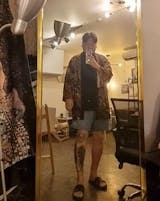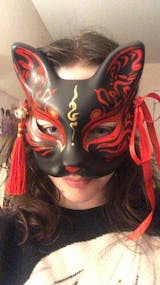I am not the type of person to write reviews but here it goes.
I really needed the clothes for an unexpected party but I chose the fast delivery option and I should say I’m impressed by their fast delivery. The product matches the pictures displayed and I’m impressed by the quality. Kudos to Eiyo Kimono.
Filters
How to Style Haori? Everything You Need to Know
What exactly is a haori? Originally, a haori is a jacket or vest that is worn over a kimono.
Haori jackets have been worn for generations in Japan, and they continue to be an important part of Japanese culture. These large swinging-sleeved garments typically come to hip length. Haori are made of several pieces of cloth sewn together carefully by hand.
Haori are also called kimono jackets. They come in many different styles, depending on your preference and style! These Japanese pieces have been around since the 17th century when samurai warriors first used them to protect themselves from battle wounds.
Today, they can be worn by men & women.
Kimono jackets now are timeless pieces. They are the perfect piece if you love the Harajuku style. They are made of a lightweight material that can easily be worn all year long by layering it over a dress, a t-shirt, or hoodie, and pairing it with jeans or shorts.
The design and prints on the haori are amazing. Most jackets are made of bright colors, Japanese patterns, and embroidered animals that carry symbolize meaning to the Japanese culture.
Here are some examples of the most popular print on haori jackets:
- Ryū (dragon) - wisdom, power, balance, freedom & good luck
- Tiger - blessing & peace
- Snake - protection, good luck & strength
- Koi fish - courage, patience & success
- Tortoise - good luck, longevity, and support
- Eagle - symbolizes the great power of nature
- Phoenix - symbolizes great luck and peace
- Japanese crane - longevity & good fortune
- Sakura - Japanese cherry blossom
- Geisha - woman performer or artist
- Kitsune (fox) - tricksters
- Samurai - Japanese warrior
- Demon oni - fierce & evil nature
- The Great Wave - an important change in Japanese society
- Anime TV characters (demon slayer, naruto)
- Japanese writing
Haori VS Kimono
How to Style Haori with a Western Touch
For ages, Japanese people have worn Haori Jackets. Its legacy keeps people connected to Japanese culture and customs. Haori is said to be ideal for adding a bit of glitz or a pop of color to any ensemble. It's also frequently worn with a kimono or Hakata. Many individuals nowadays choose to match it with a modern look, such as a shirt and trousers. On warmer days, you can effortlessly switch it with your Jacket.
Pair it With Your Jeans
Haori jackets may be worn with a variety of Western clothing, including formal dresses and blouses, and skirts. The haori looks great with jeans and a T-shirt. We recommend pairing it with western clothing because it's easier to incorporate a jacket into your look than an entire kimono ensemble: a black haori with delicate patterns can look nice with a pair of dark jeans and heels.
How to Wear Haori with a Dress
If you want to buy a haori, you should pick one based on your fashion style in terms of how colorful you want it to be, as well as the length. You may dress up your haori by wearing it with jeans or leggings and a shirt. Wear it over a long classy dress for an elegant look. Haori can easily be paired up with a classic long dress or mom jeans Because it is loose-fitting and easy to wear. Women who wear haori pair it with a sleeveless dress. You can pair it with heavy winter sweaters, kimono layers, or any other outfit.
Is it possible for a lady to wear a haori with an obi?
Women's haori may be especially lovely, with exquisite Japanese textile art on them. They are not worn with an obi, but they look beautiful with a belt or sash tightened in. They are often tied extremely loosely with a pair of ties known as a Himo, which are purchased separately from the haori.
When buying a Haori, what should you look for?
Before purchasing a Haori, there are several factors to consider. The first is the quality. Examine the fabric quality, stitching, and overall condition of the garment thoroughly. The modern Haori is often made of polyester or cotton. If you want a silk garment, go for a vintage Haori.
In short, check it thoroughly before purchasing. You should bear in mind that silk cannot be cleaned, so select the color of your Haori properly while purchasing.
Haori and hakama have been worn for generations and are still an important part of Japan's culture and customs today. Visitors can participate in this custom by attending festivals, rituals, and ryokan and kimono rental stores. Have fun wearing and learning about these essential garments!






































































































